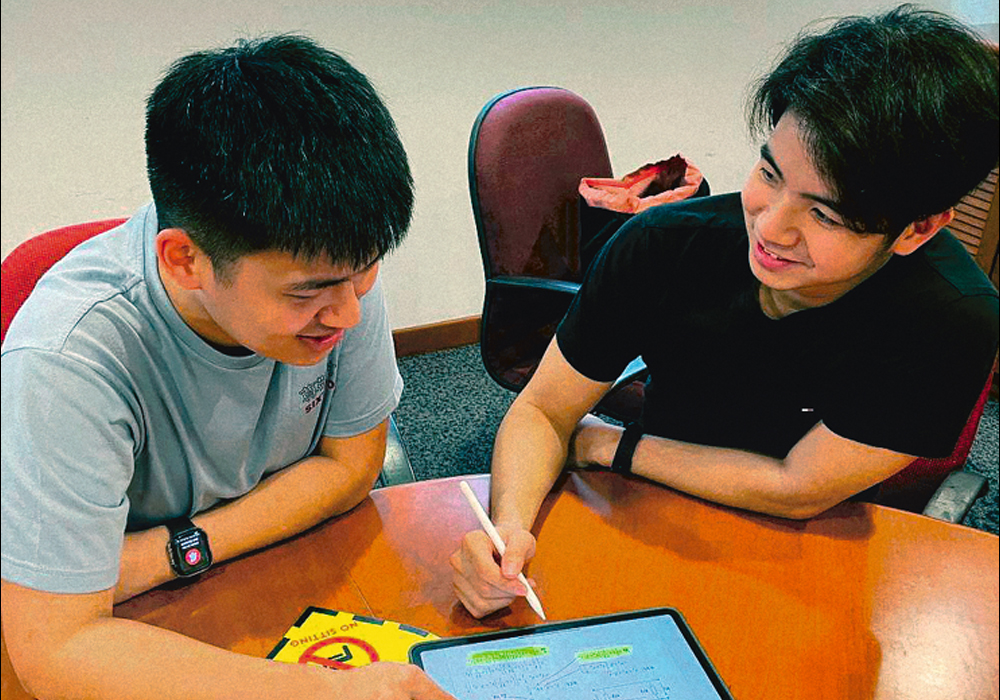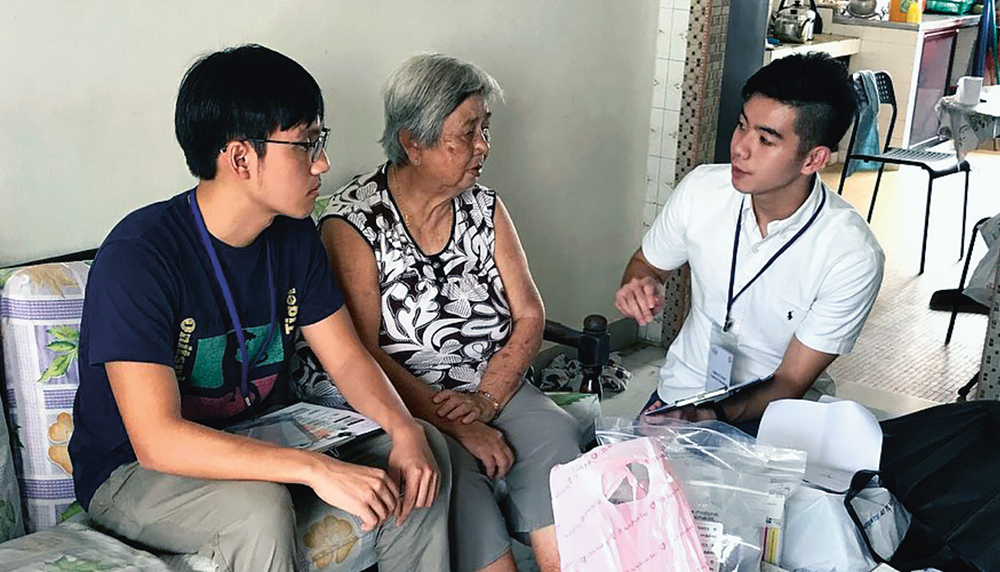Showing Gratitude Through Service
Having taken an unconventional path to arrive at where he is today, Mr Bryan Cheung (Design and Engineering ’23) is now committed to helping those around him.
WHO HE IS
For evidence that kindness begets kindness, look no further than Mr Bryan Cheung. Inspired by the support he received over the years, he has given back to various groups in the community, including underprivileged students and the elderly.
Nine-year-old Udhaya’s eyes light up as she unmutes her mic. “The answer is ‘A’,” she says confidently. “That’s right — good job!” replies Mr Bryan Cheung, who is leading this virtual tuition class. To the uninitiated, this might appear to be a typical virtual enrichment class taking place in Singapore. But it is not. Mr Cheung is actually a volunteer tutor, and his student, Udhaya, is in Sri Lanka. She dials into the weekly Sunday class to improve her English, and her parents hope these classes will help her excel in school and, eventually, break out of poverty. The classes were the brainchild of NUS students from Raffles Hall, as part of its Overseas Community Involvement Programme (OCIP), explains Mr Cheung, who recently graduated from the University. Similar programmes are also run to help disadvantaged students in Vietnam, he adds.
Dedicating several hours every week to helping the underprivileged may be a tall order for many, but not for Mr Cheung, who was an active volunteer with the tuition programme during his time at the University. “I know what it’s like to struggle through school,” he shares. “So wherever I can, I’d like to help others out.”
RECEIVING AND GIVING BACK
Mr Cheung’s experience of struggling through school may surprise those who are recently acquainted with the 26-year-old. After all, he has just graduated from NUS and is preparing for his postgraduate studies at Imperial College London later this year, on a scholarship from transport giant SMRT Corporation. But those who know him better would understand how far Mr Cheung has come — scoring 91 in his PSLE then taking a slightly longer route to university after studying at the Institute of Technical Education and a polytechnic. “What I remember from that journey was the kindness of others, especially my parents,” he reveals. “I am very grateful for their unconditional support. They did not pile on extra pressure, and this allowed me to go at my own pace. I feel that such kind of pressure sometimes affects children negatively.”
Support came from beyond his family too, Mr Cheung adds. “There were always people willing to believe in me — from my friends and classmates, to complete strangers who were ready to take a chance on me and help me out. And I want to do that for other people too.” Such support has sparked his earnest passion for helping others. Beyond his involvement in the Raffles Hall OCIP, he also volunteered as a peer tutor, helping fellow coursemates from the College of Design and Engineering. Peer tutoring was introduced in 2015 at the then Faculty of Engineering. It pairs junior students with senior tutors who had excelled in certain modules.

ENGINEERING FOR GOOD
During his time at NUS, Mr Cheung also served as the Vice-President of the Engineering Good: Student Chapter, which tries to improve the lives of people through sustainable engineering solutions. Projects spearheaded by the group include:
- A wearable communication device that helps students with difficulties in speech and mobility to communicate with others.
- A geotagging system that keeps students with special needs safe while at school.
 Mr Cheung tutoring a fellow student.
Mr Cheung tutoring a fellow student.
For Mr Cheung, those topics were Electromagnetics for Electrical Engineers, Introduction to Electrical Energy Systems, and Digital Design. “These were topics that I scored quite well in, so I was happy to lend a helping hand,” he tells The
AlumNUS. “Plus, I myself had benefited from peer tutoring when I first enrolled at NUS, so I wanted to give back.”
 Engaging seniors as part of Comcare Outreach efforts.
Engaging seniors as part of Comcare Outreach efforts.
BLENDING WORK AND PASSION
During his time at NUS, Mr Cheung also saw how one could combine work with community service. When it was time for his group to consider their Final Year Project last year, he used it as an opportunity to tackle a growing problem in Singapore: the well-being of seniors living alone. Through his stint as a grassroots volunteer with Siglap Community Club, he learnt about the plight of these seniors. “I came across stories of seniors who had fallen down at home and were waiting for someone to hear their cries for help,” he shares. “It would have been quite traumatic and dangerous.”
Banking on his experience, he led his team on a study to understand the risks faced by seniors living alone and gather their input on a solution that would help them. These interviews were made easier by some of the interdisciplinary modules Mr Cheung took during his time at NUS, particularly one from the Faculty of Arts and Social Sciences that researched and shed light on different demographic groups in Singapore.
![]()
There were always people willing to believe in me and support me — from my friends and classmates, to complete strangers who were ready to take a chance on me and help me out. And I want to do that for other people too.
Through these interviews, Mr Cheung and his group learnt that for many seniors living alone, being constantly monitored by caregivers was a luxury they could not afford. So the team designed a system that uses artificial intelligence and the Internet of Things (IoT) to detect falls. They also took into account that many seniors are wary of wearable devices and CCTV cameras. By installing a smart pressure monitoring system and implementing machine learning algorithms, his team successfully achieved the goal of detecting and reducing the false fall rate with a user-friendly dashboard system. Mr Cheung credits this achievement to the collaborative efforts of his teammates.
The system is currently in its prototyping stage, and Mr Cheung and his team are awaiting the results of a grant application to develop the system further. Assisting the elderly, meanwhile, is something he hopes to continue when he returns from his postgraduate studies in a few years. “The entire experience has been very heartwarming,” he says. “I enjoy interacting with seniors a lot, so this has been a meaningful opportunity to try and help them.”